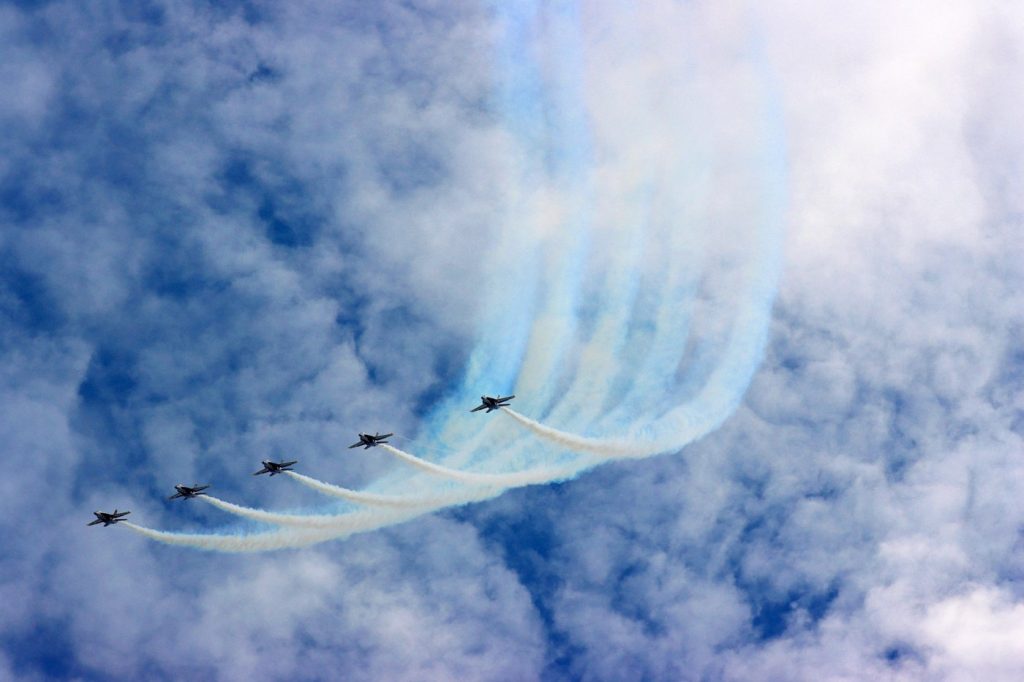Watching “The Blue Angels” in your living room, you can’t help but be envious of those making the effort to catch the documentary in IMAX.
Playing May 17 through 23 in theaters with IMAX auditoriums, “The Blue Angels” jets onto Prime Video on May 23.
Depending on your home setup, “The Blue Angels” — billed as offering unprecedented access to the staple of air shows across the country that is the United States Navy Blue Angels program — still may look and sound pretty darned fierce, but no home theater can compare with the stage an IMAX setup can offer the exhilarating aerial footage that is by far this movie’s greatest selling point.
That’s the way you’d love to experience the roaring engines and the trails of smoke.
However, even the largest of IMAX screens can’t plaster over the fact that this Paul Crowder-directed film does not soar when it comes to human drama. As it covers the program from its winter training period through its transition late in the year to those who will fly the Boeing F/A-18 Super Hornets in 2023. Yes, viewers are introduced to the men piloting in the shows throughout 2022 — and the myriad men and women supporting them in other roles on the team — but we barely get to know them.
We do go home, briefly, with Capt. Brian Kesselring — who, as commanding officer and flight leader, is bestowed with the nickname “Boss” — and meet his Marine officer wife, Ashley, and their two little children. Really, though, this feels like a bit of box-checking more than anything else.
Even while showing a playful streak within the program, “The Blue Angels” is every bit as squeaky-clean as its G rating would suggest. If there WERE any real drama behind the scenes, you wouldn’t know it from the film.
Counting among its producers filmmaker J.J. Abrams (“Star Wars: The Force Awakens”), actor Glen Powell (“Top Gun: Maverick”) and retired pilot Greg Wooldridge, the only three-time “Boss” of the Blue Angels, it too often feels like a really expensive recruitment video. The honor of being chosen to be a part of the team and the responsibility to perform to its high standards and to be safe while sometimes flying as close as a few inches from other pilots comes through loud and clear.
That isn’t to say it’s not enjoyable to follow the progress of the team, even as the members go through the monotonous grind of winter training — waking up and going to bed in darkness, flying two to three times in between and sitting through video-aided debriefs in which they get to relive their mistakes.
Members of the United States Navy Blue Angels program review video footage of a training session in a scene from “The Blue Angels.” (Courtesy of Amazon Content Services)
You learn about the different components of their show routine, four planes frequently flying in “Diamond” formation and complemented by solo maneuvers, before the team conducts the six-plane “Delta” formation.
The Blue Angels fly in the familiar “Diamond” formation in a scene from “The Blue Angels.” (Courtesy of Amazon Content Services)
They are supported on the ground by crew men and women — each plane is checked thoroughly before each flight and Monica Borza, the flight surgeon who monitors them closely.
“I know where they should be at all times, their attitudes, their flight speeds,” Borza says.
The team has three new pilots this year, with two others flying in different aerial positions, adding to the stress of Borza and others.
Later in the film, we see other pilots vying to join the team, including Amanda Lee, who hopes to be the first female chosen to fly, and watch as those selected take their first steps toward the 2023 season in the form of some unpleasant-seeming training to prepare them for the gravitational forces with which they will be confronted when they are performing the sky-high wizardry.
“The Blue Angels” also offers a history lesson — about the team’s formation in 1946 by Adm. Chester Nimitz, then the chief of Naval operations, who wanted to create a flight exhibition team to raise the public’s interest in naval aviation and boost Navy morale — complete with some archival footage.
That grainy footage helps remind us that state-of-the-art equipment and techniques was used to capture the footage of this film with the help of a helicopter outfitted with IMAX-certified cameras that became the first civilian aircraft permitted to fly within the performance space, called “the box,” according to the film’s production notes. (The aerial camera unit from the aforementioned “Top Gun: Maverick,” led by aerial coordinator Kevin LaRosa II, was brought on board for this project, and it’s easy to wonder if a documentary about the making of this documentary would be a bit more compelling from a narrative perspective than the storyline of “The Blue Angels.”)
“The Blue Angels” isn’t the first time the planes have been captured in moving pictures, with previous showcases including the mid-1990s documentary “Blue Angels: Around the World at the Speed of “Sound and the memorable music video for the 1986 Van Halen hit “Dreams.”
Nonetheless, it’s safe to say you’ve never seen them quite like this before.
‘The Blue Angels’
Where: Prime Video.
When: May 23.
Rated: G.
Runtime: 1 hour, 33 minutes.
Stars (of four): 2.5.
Blue Angels in Cleveland
Cleveland will host the U.S. Navy Blue Angels as headliners of the 2024 Cleveland National Air Show, Aug. 31 through Sept. 2 at Burke Lakefront Airport. The team will present an hourlong choreographed presentation, with Cleveland being one of 30 cities hosting the Blue Angels in 2024, according to press information. Get information and tickets at clevelandairshow.com or call 216-781-0747.


